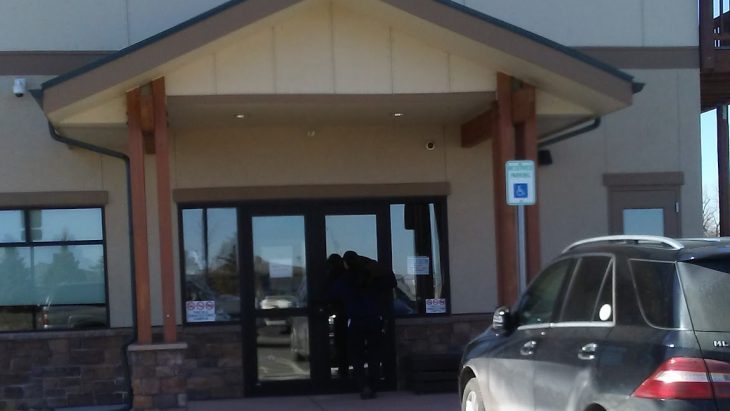Centennial Mental Health Center Fort Morgan

About Centennial Mental Health Center Fort Morgan
Centennial Mental Health Center is a mental health and substance use disorder (SUD) treatment provider. They have several locations including the outpatient facility in Fort Morgan, Colorado. The program includes medication assisted treatment (MAT) for detoxification and maintenance. Additionally, they offer therapeutic approaches to SUD.
They accept health insurance, Medicare, Medicaid, military insurance (TRICARE), and other state financed insurance plans (other than Medicaid). There is some payment assistance available, and they have a sliding fee scale for uninsured clients. The facility is a smoke free environment.
Integrated Dual Diagnosis Treatment in a Healing Environment
The staff here emphasizes integrated services, combining SUD and mental health treatments for clients with co-occurring disorders (dual diagnosis). They offer a unique community garden that is a healing space for meetings and a learning opportunity.
The Fort Morgan Community Garden is a place for social engagement where individuals gain practical gardening skills. Gardening offers a chance for physical activity, and clients can eat the food they grow which encourages healthy nutrition habits.
Serving A Diverse Population
The facility in Fort Morgan is near Riverside Park. The park has recreational facilities and walking trails where clients can relax and work on their treatment plans and strategies for sobriety.
In addition to treating individuals with co-occurring disorders, the staff has experience with pregnant and postpartum women, transitional age young adults, and children with serious emotional disturbance (SED).
They treat people referred from the judicial system, as well as those with post traumatic stress disorder (PTSD), and a background of sexual abuse or other traumas.
Detoxification With MAT
Clients with opioid use or alcohol use disorders can be prescribed MAT for detoxification. MAT offers individuals a comfortable detox with reduced cravings and fewer uncomfortable side effects.
They use several different MAT drugs at the clinic. These include buprenorphine, oral and injectable naltrexone, acamprosate, and disulfiram.
Some clients have highlighted the facility’s supportive and caring staff, though some have voiced concerns about court interactions and family dynamics.
| Levels of Care | Detox Service Setting | Programs | Payment Options | ||
|---|---|---|---|---|---|
|
In outpatient therapy, you’ll attend therapy sessions several times each week while living at home. This is ideal if you have a strong support system and a lower risk of relapse. Outpatient treatment offers flexibility to maintain work, school or family obligations. |
Dual diagnosis programs address substance use disorders and co-occurring mental health conditions simultaneously. This integrated approach to care improves the likelihood of long term recovery and stability by addressing the root causes of addiction. |
||||
|
Outpatient detox gives you access to medically supervised withdrawal services while still allowing you to live at home. You’ll attend a clinic for treatment and monitoring. This flexible option is suitable for those with mild to moderate withdrawal symptoms who have strong support systems. |
|||||
|
Adult programs address the substance use and life challenges specific to adults. Therapists can deliver sessions in individual, group and family settings. Services often include job support and life skills training in a structured environment. |
Alcohol detox programs offer medical support to help individuals withdraw safely from alcohol. Your care team may use medications to ease your symptoms and provide medical monitoring to address complications. |
Cognitive behavioral therapy focuses on changing harmful thought patterns and behaviors associated with addiction. You’ll learn healthier coping mechanisms by identifying and replacing negative thoughts. This improves your emotional resilience and decreases your relapse potential. |
Opioid detox uses medications to ease severe withdrawal symptoms. It also includes medical supervision to help you manage potential complications. These services allow you to stabilize and begin a recovery plan. |
Senior programs address the unique needs of older adults like chronic pain, grief and isolation. Programs include peer support and medical oversight for age related health concerns. The goal is to improve quality of life and promote sober aging. |
Young adult programs are designed for individuals who are transitioning into adulthood. Topics of discussion typically include identity, independence and peer relationships. Providers may also offer life skills training and career support. |
|
Payment Assistance
|
Medicaid
|
Medicare
|
Military Insurance
|
Private Insurance
|
Self Pay
|
Levels of Care
In outpatient therapy, you’ll attend therapy sessions several times each week while living at home. This is ideal if you have a strong support system and a lower risk of relapse. Outpatient treatment offers flexibility to maintain work, school or family obligations.
Dual diagnosis programs address substance use disorders and co-occurring mental health conditions simultaneously. This integrated approach to care improves the likelihood of long term recovery and stability by addressing the root causes of addiction.
Detox Service Setting
Outpatient detox gives you access to medically supervised withdrawal services while still allowing you to live at home. You’ll attend a clinic for treatment and monitoring. This flexible option is suitable for those with mild to moderate withdrawal symptoms who have strong support systems.
Programs
Adult programs address the substance use and life challenges specific to adults. Therapists can deliver sessions in individual, group and family settings. Services often include job support and life skills training in a structured environment.
Alcohol detox programs offer medical support to help individuals withdraw safely from alcohol. Your care team may use medications to ease your symptoms and provide medical monitoring to address complications.
Cognitive behavioral therapy focuses on changing harmful thought patterns and behaviors associated with addiction. You’ll learn healthier coping mechanisms by identifying and replacing negative thoughts. This improves your emotional resilience and decreases your relapse potential.
Opioid detox uses medications to ease severe withdrawal symptoms. It also includes medical supervision to help you manage potential complications. These services allow you to stabilize and begin a recovery plan.
Senior programs address the unique needs of older adults like chronic pain, grief and isolation. Programs include peer support and medical oversight for age related health concerns. The goal is to improve quality of life and promote sober aging.
Young adult programs are designed for individuals who are transitioning into adulthood. Topics of discussion typically include identity, independence and peer relationships. Providers may also offer life skills training and career support.




